- Home
- Belva Plain
Random Winds Page 4
Random Winds Read online
Page 4
“Sorry I scared you,” she said. “I’m Jessie Meig.”
I told her I was the doctor’s son and she wanted to know whether I was a doctor, too. I said I was going to be, this time next year.
I don’t know why I’m writing all this down, except that it’s been such a strange day.
“I thought you were calling on my sister,” she said. “If you want to see her, she’s in her studio across the hall.”
I told her I didn’t know her sister.
Then she said, “Well, when you do know her you’ll probably fall in love with her.”
“Why on earth should I?”
“Because men always do. But nothing ever comes of it. At least, not yet. Father will keep them away until he finds someone he approves of.”
I was so dumbfounded by all this that I didn’t know how to answer.
And she said, “Anyway, Fern’s not really interested in men right now. She wants to be a great painter. Besides, she’s timid to start with. If I looked like her, I wouldn’t be timid, I can tell you that.”
“I would hardly call you timid,” I said.
She laughed. “You’re right, I’m not. For a person like me it would be fatal. I’m not afraid and I don’t worry. Now take you—you’re not afraid, but you are a worrier. I see it in your face.”
Perhaps she felt she had to be startling, to entertain? I don’t really know. But I was beginning to be amused.
“I guess I am,” I said. “It runs in the family. My father worries about the progress of mankind and my mother worries about the roof over our heads.”
“I suppose you’re poor,” she said.
By this time nothing surprised me, so I said: Yes, we were, fairly so.
“Too bad. Country doctors work so hard for so little.”
I was actually beginning to like the bite in her speech! Most of the time people talk and don’t say anything real, anything they truly mean. You could see this girl was honest and intelligent. What a foul trick nature played, attaching that bright head to such a body!
And suddenly something came flashing up from the bottom of my mind.
“Why, I remember you. We were in the buggy—that’s how long ago it was—passing this house and you came out with your mother and sister. I can see you clearly.”
What a stupid, bumbling idiot I was! Because, of course, what I meant was: I remember the crippled girl.
So I tried to cover up quickly. “I especially remember your mother.”
“She died seven years ago.”
Then I tried to cover up some more and moved to the bookshelves. I must say, they did have a lot of great books. And I started mumbling about Sandburg’s Lincoln and how that was one of the first things I was going to buy when I could afford it.
We talked some more about books until Pa came downstairs and we left. I’m still feeling red in the face. A strange encounter.
A week later Pa found a package on the front porch. It was for me, Sandburg’s Lincoln, with a card from Jessie Meig! “Anybody who wants anything as reasonable as a book shouldn’t have to wait for it. So please accept this and enjoy it.”
I suppose I could have written a note of thanks, but since I almost had to pass the house on an errand in Cyprus, I thought it would be nicer to stop by with my thanks. So I went in and asked the maid for Miss Meig, but instead of seeing Jessie, I was taken to the sister. She was at work before an easel and I could see she didn’t want to be disturbed, so I said I was sorry about the mistake and backed right out.
It’s queer, though, how much I remember of the few seconds I stood there! The most startling face looked up at me: dark, almost olive, with extraordinary pure blue eyes. I’ve never seen such eyes. Her hair is curly, like Jessie’s, but shorter. I thought of the way curls are carved on ancient Greek statues. She wore a white smock. There was a drop of paint on her sandals. And that’s all, except that I don’t understand why the picture stays so sharp in my mind.
That nonsense Jessie spoke about people falling in love with Fern?
No need to worry! I can’t afford to complicate my life for a good long while yet I shall probably never even see the girl again.
Still, I feel a sense of drama, sitting here, writing these words.
Chapter 4
The senior year flew by faster than any of the years before it. Martin really began to feel like a doctor. A subtle power came to life in him, as though he could instinctively smell out disease; could feel it pulsing under his fingers and glimmering before his eyes. He began to plan an intellectual game, even taking notes on the subway.
“A laborer, large man in a yellow Windbreaker. Italian. Must have been a good-looking, powerful youth. He is eating a doublenut chocolate bar, crunching and chewing with pure pleasure. Putting on fat. In a few more years his strength will ebb. At fifty he’ll be jelly and flab. Hypertensive already, I’ll wager, although he doesn’t know it.
“A man of forty. Somber, intelligent face. Anglo-Saxon. A green pallor. Cigarette-stained fingers. Reaches for cigarettes, observes ‘no smoking’ sign, shoves them back into pocket. Ulcer type. A lawyer, perhaps? Underling in a large firm. Burdened with responsibilities and nightwork.”
His mind stretched. He felt himself reaching with new curiosity into far corners, to the Academy of Medicine to hear a psychiatrist lecture on hypnotism, to listen to new theories about cancer and new procedures in the operating rooms.
One man, a neurosurgeon, attracted him especially. He was a Spaniard, Jorge Maria Albeniz, trained in Barcelona, a frail, elderly man with a formal European manner. Behind his back the nursing staff spoke of him fondly as “The Duke.” By the medical staff he was thought to be talented but odd. It was said that, if he had wanted to, he could have made a fortune. But most of his time was spent in his basement laboratory or at the clinic where he treated the sick and taught. He liked to operate only when the case was so difficult that other men were reluctant to take it.
Martin watched one day while he removed a pituitary tumor from a young woman. The tumor was too far gone for complete removal.
Albeniz spoke as he worked.
“With X-ray treatments, she may have a few more years. Her children will be that much older, nearer to being able to take care of themselves. We’re buying time, that’s all.” He looked up at the silent young men surrounding him. “As you see, there is a terrible lot we still do not know how to cope with.”
This simple honesty touched Martin. Brainwork, he thought, must be the most challenging field of all. And he looked in wonder at Albeniz. How did a man get to be like that?
He began to feel a new and unfamiliar restlessness.
It followed him home on vacation. Suddenly he noticed things he hadn’t seen before. His father had some absurd and ignorant opinions.
Of a man with chronic headaches he said that they ran in the family.
“I remember how his Uncle Thaddeus used to fall into rages from them. He’d be so sorry afterward. You’ve got to keep spices out of the food. They thicken the blood and you get congestion in the head.”
Martin made no comment. So much for the temper headaches that might have been caused by anything from sinus to migraine to allergies, tumor or incipient psychosis. Or maybe only worry over the mortgage. Spices in the food!
He went with Pa on a house call. The family had a fat little four-year-old boy of whom the mother was proud. “He’s a bruiser, ain’t he, Doc?”
“Hello, there, Dale,” Pa said. “Yes a fine, fat boy. Anyone can see he gets plenty of your good rich cream and butter.”
“Only thing, all last winter, I don’t know why I forgot to mention it to you, he complained that his arms and legs hurt. Not real bad, I could tell, because he didn’t cry. It just ached him, you know.”
“Where? In the joints?”
“Knees and elbows.”
Pa waved his hands. “Nothing. Just growing pains. He’s growing too fast, that’s all. I wouldn’t worry about it.”
Whe
n they were outside, Martin observed, “Don’t you think you ought to consider rheumatic fever? And the child’s too fat besides.”
“No, I don’t and he isn’t,” Pa said shortly.
Well, some sort of father-son rivalry was only to be expected! They had been singularly free of all that up until now. He certainly didn’t want a rivalry to pull them apart. So again he kept still.
On the third day at the noon meal, his mother inquired about someone’s baby.
“A lot better,” Pa told her. “Dover’s Powders and an enema. That does it.”
This time Martin couldn’t resist. “Pa, we don’t use Dover’s Powders anymore.”
“What do you mean ‘we don’t’? Why, I’ve been using that stuff since before you were born!”
Martin opened his mouth to retort. Then he thought: An older man must be allowed to keep “face.” If I’m to show him anything new, I must do it carefully and in private. We’ll need to work well together, we must and we will—
Still, a restlessness, the same that had been with him for weeks now, or for months, came over him. He could hardly sit still for the tingling in the solar plexus. The meal, with second helpings for Pa, with coffee for his mother, seemed endless.
“How about my borrowing the flivver this afternoon?” he asked. “Thought maybe I’d run up to Cyprus on a couple of errands.”
When he had finished at the drugstore and the hardware store, he got back in the car to go home. There was, after all, no place else to go. It was a day of January thaw, with dripping icicles overhead and slush underfoot, a good day to go home, bring the restlessness under control and do some studying for midterms.
That being his intention, it was never quite clear to him how it happened that on Washington Street, heading toward home, he suddenly swung the car around and found himself, three minutes later, parked at the curb facing two iron deer in front of a dark stone house.
There was the same shocked disturbance of equilibrium as the first time.
“Why are you staring at me?” she asked.
“Because I’ve never seen a face like yours.”
“It can’t possibly be that unusual!”
“You must know it is. Blue eyes don’t belong in such a Spanish face, such a Greek face.”
“There’s no Spanish in me, or Greek either.”
He supposed she was not “beautiful,” in the accepted sense; she was tall, almost as tall as he, and her coloring was too strange. But there was something so—so dreaming in her soft expression, as if she were seeing things he couldn’t see!
In the left hand she held her brushes like a fan. Now, choosing one, she bent to the easel and laid a stroke of red on a bird’s wing: three scarlet birds sat on a wire fence against a background of snow.
“Am I interrupting your work?” he asked.
“No. This one’s finished. At least, it’s the best I can do with it.”
He knew almost nothing about art. Perhaps this was merely a sentimental postcard? But it was vivid and it appealed to him. So he said sincerely, “It’s a pretty piece.”
She considered it, frowning slightly. “I can’t really tell. So far, I’ve only imitated, you see. Look at this, for instance.”
This was a small square of canvas covered in many tones of pink, whirling from fuchsia to pearl. Looking closely, one saw that these were trees in blossom, their dark forked branches buried in the billowing pink.
“Monet. I was trying to be Monet. The water-lily thing, you know. And over there, those boats drawn up on the beach, that’s Winslow Homer.”
“ ‘M.F.M.,’ ” he read in the corner. “What’s the ‘M’ for?”
“Mary. My name is Mary Fern. They call me Fern at home because Mother’s name was Mary. But I’d much rather be called Mary.”
“Then I’ll call you Mary. I saw you once when I was about nine years old,” he said irrelevantly.
“I know. Jessie told me … She says you’ll be a wonderful doctor. You weren’t embarrassed, the way most people are when they meet her. They never seem to know how to talk to her.”
“There shouldn’t be any different way of talking to her.”
“There shouldn’t be, but there is. People are sorry for her. And of course she knows it.”
“How hard it must be for her, having to live so close to you all her life!”
Instantly Martin regretted the exclamation. But Mary answered simply.
“I know. We don’t get along very well.”
“She can’t be much older than you?”
“Younger. We’re thirteen months apart.”
There was a stillness in the room. Airy and white as it was, with its white walls and the view of the winter day through uncurtained windows, it had no relation at all to the rest of the cluttered house.
“I like this room,” he said. “I feel peace here.”
“There is peace here. Most of the time. Except when I’m in one of my rebellious moods.” Mary laughed. “I’ll bring coffee. Just clear those paint pots off the table, will you, and we’ll have it by the window.”
The sun struck glitter from the gilt rims of the cups and from the ring on her finger, moving round and round as she stirred the coffee. The ring was a topaz set in curiously twisted gold. Her nails had sharply marked half-moons. There was a small mole in the center of her cheek. He had never felt such tremendous, intense awareness of another human being. It became necessary to speak very calmly.
“What did you mean by ‘your rebellious moods’?” he asked.
For a moment she didn’t answer. Then she said, “You see—maybe it’s entirely foolish, this thought of greatness in art—but how can I know unless I’m taken seriously?”
“And no one does?”
“My mother did. If she were living, I’d be in New York or somewhere studying. But Father thinks it’s all ‘nonsense.’ If I had any money of my own—”
“You’d go away?”
“Oh yes! Yes! I do so want to see somewhere else!” And she made a free gesture with her arm. “Haven’t you ever wanted to—get beyond?”
“All my life, as far back as I can remember.”
“And have you done it?”
“In a way. My beyond is my work. Medicine.”
“Ah, then you’re very lucky! I don’t even know whether my work is any good! I’ve done nothing yet Nothing. And I’m already twenty.”
“You’re in a great hurry. I understand.”
“Do you? Do you ever feel you want to hear all the music ever written, see all the great cities, read all the books, know everything?”
He smiled. “All that and art, too?”
“Art, too. I have to find out who I am. Because I’m surely not Monet or Winslow Homer, am I?” Then with sudden embarrassment she said, “I’m sorry. You can’t possibly be interested.”
“You’re wrong.”
“Well. You did ask about my ‘rebellion,’ didn’t you? It’s not very savage or successful, so far. And sometimes I’m even ashamed of it.”
“Why should you be?”
“Because of Jessie. After all, I have so much. She has so little.”
He nodded. What conflict must be within these walls!
His eye fell on a watercolor hung on the wall between the windows: a girl in a swing, her curved back half hidden by a fall of leaves.
“That’s Jessie?”
“Yes. She didn’t like it. But nobody sees it in here.”
“It’s very good, I think.”
“It’s the truth, anyway.”
“People don’t always want to see the truth.”
“Oh, Jessie sees it well enough! It’s Father who doesn’t, or won’t. She needs so much to talk to somebody about her life! What’s to become of her? Father’s not a person one can really talk to. He wants to pretend there’s nothing the matter, while all the time he’s so afraid.”
Martin didn’t know what to answer.
“What will become of her?” Mary repeated.
> “Won’t she just stay here as she is?”
“Father won’t live forever. And I’ll do what I can for my sister, but I probably won’t stay here, either.”
He felt absurd alarm. “Suppose you were to be married?”
“I doubt I shall marry anyone from Cyprus.”
He wanted to ask, “Why? Is there anyone? Do you—” But that, too, would have been absurd.
When they went to the door, he told her he’d be back for a while in the summer after graduation and asked whether he might come again.
“Come. But come and see Jessie, too.”
“Do you always think of Jessie?” he asked curiously.
“Wouldn’t you, if she were your sister?”
He considered, feeling the moment with acute and sudden pain: the allure of the girl, the melancholy of the house and, over all, his old familiar sense of time eluding.
“Yes,” he admitted. “I probably would. So I can just be a friend to both of you, can’t I?”
Spring came and commencement and he was home again. His mind was filled with Mary. He thought of all the clichés in the language. “Head over heels.” “First sight.” “Chemistry,” whatever that might mean. All were expressions which he had once found unbelievable.
He was, of course, too easily moved; he knew that about himself. He was embarrassingly given to tears not easily blinked away. Only a month or two ago, for example, passing an exquisite baby in a carriage, a Delia Robbia cherub with bright hair, he had stopped. The baby had given him a smile so miraculous, and he had been so touched, that the mother, seeing the absurd rise and glisten of his tears, had hurriedly wheeled the carriage away, thinking no doubt that he was some sort of madman and possibly dangerous.
Now joy pierced him through: his own, and the joy of the eyes in that dark, poetic face.
But he hardly ever saw Mary alone and the summer days were vanishing. Birds flash among dense trees; fish flick into deeper water, out of sight. So their interrupted minutes fled.
Twice Martin took her to the movies. The third time, at the father’s suggestion, Jessie went along. Once there was a picnic, a family affair. In the evenings the family sat together in the library, Jessie and the father playing chess.

 The Golden Cup
The Golden Cup Her Father's House
Her Father's House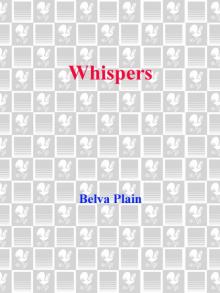 Whispers
Whispers Crescent City
Crescent City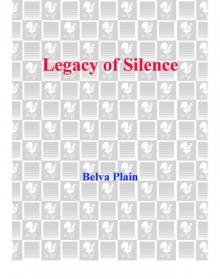 Legacy of Silence
Legacy of Silence Crossroads
Crossroads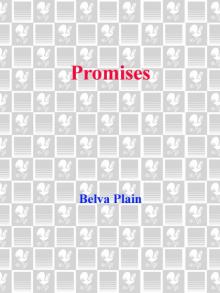 Promises
Promises After the Fire
After the Fire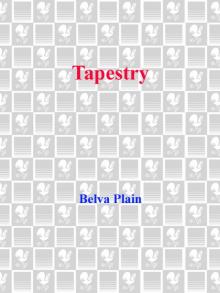 Tapestry
Tapestry Looking Back
Looking Back Heartwood
Heartwood The Carousel
The Carousel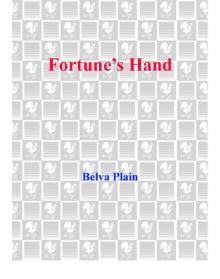 Fortune's Hand
Fortune's Hand Homecoming
Homecoming Random Winds
Random Winds Harvest
Harvest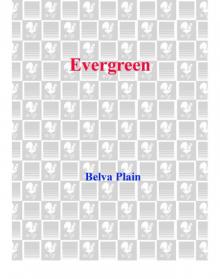 Evergreen
Evergreen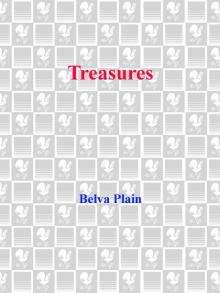 Treasures
Treasures The Sight of the Stars
The Sight of the Stars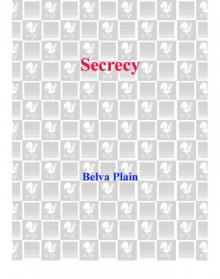 Secrecy
Secrecy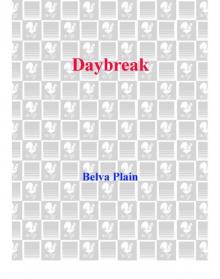 Daybreak
Daybreak Eden Burning
Eden Burning